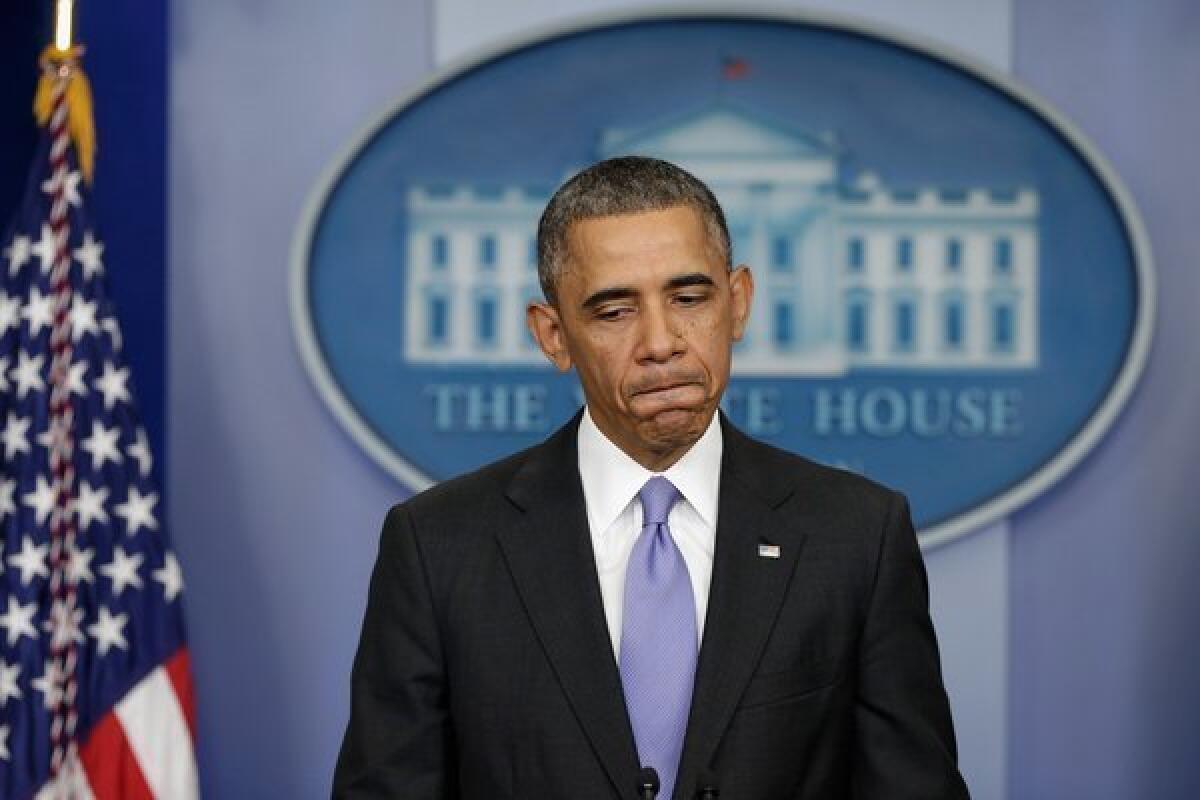Obama’s reversal of fortune

- Share via
When it comes to his healthcare law, President Obama faces a political version of what insurance folks call “adverse selection”: All the bad news is sticking to him and most of the good news is sticking to someone else.
Adverse selection, as we’ve been hearing lately, is what happens when a health insurance plan attracts too many sick people and not enough healthy ones. The plan’s costs go up, its rates rise, healthy people drop out and, before you know it, you’re in what actuaries call a death spiral.
Obama isn’t at that point yet. But the self-inflicted damage he has suffered in the last month is serious and likely to be enduring.
PHOTO ESSAY: Obamacare -- and 8 other bungled launches
For most of his time in office since 2009, polls found that although most Americans didn’t fully agree with Obama’s positions on national issues — a majority considered him more liberal than they were — they liked and trusted him. When it came to whether Obama was honest, strong and looking out for the interests of ordinary people, the president’s scores were healthy.
No longer. In an ABC News-Washington Post poll released Tuesday, for example, Obama fell into negative territory on those three crucial measures. And that’s a problem.
A president who scores well on those attributes — as Obama always had — gets the benefit of voters’ doubts when he stumbles. A president who falls short on those qualities risks being blamed for anything that goes wrong.
That means that when insurance policies get canceled, rates rise or insurers refuse to reinstate old policies, more people will be ready to blame Obama for those failings without giving him credit for what’s working.
And that’s unfortunate for the president because some things are, in fact, working. In Kentucky, Connecticut, Washington, New York and California, state-run health insurance marketplaces are enrolling buyers by the thousands. But once a president loses voters’ confidence in his honesty, they aren’t likely to see his achievements in the same light.
Instead, the governors and insurance commissioners will get credit for any successes, and they’ll deserve it. The president will still be wrestling with a balky federal marketplace — and suffering by comparison. It may look as if Obamacare can work but only when Obama himself isn’t running it.
The problems won’t end once the federal marketplace struggles to its feet either. From now until well into next year, every individual story of someone dissatisfied with their insurance choices will serve as a renewed reminder that Obama made promises that weren’t true.
Things could get even worse if the president is unable to keep another of his promises: that the federal government’s Healthcare.gov website will be working well by Nov. 30.
Already, the president has begun trying to redefine success downward on that goal. “The website will work much better on Nov. 30 … than it worked certainly on Oct. 1,” he said last week. But he’ll have trouble convincing anyone that a marginally better website fulfills his pledge.
And next year, when the new insurance policies are up and running, the president will face another gap between his rhetoric and reality. “No matter how we reform healthcare,” he said in 2009, “we will keep this promise: If you like your doctor, you will be able to keep your doctor. Period.”
As almost every user of employer-provided insurance knows, insurers routinely change the lists of doctors in their networks; nothing in the Affordable Care Act guarantees a patient’s access to her current physician.
It seems certain that in the coming year we’ll be seeing media stories about unhappy patients who can no longer see their usual doctors — and we’ll be hearing that quote from Obama a lot.
Once that’s over, yet another problem looms. Next spring, insurance companies will set their rates for 2015, based on their initial experience with Obamacare enrollment. If too many sick people have signed up and too few healthy ones, we’ll be learning about adverse selection all over again — just in time for the congressional election campaign.
It’s hard to fault the GOP for enjoying a bit of schadenfreude.
In a memo to his clients on Monday, Republican pollster Bill McInturff compared Obama’s condition to President George W. Bush’s loss of public trust after his halting response to Hurricane Katrina in 2005.
“Once unleashed, these negative sentiments are difficult to reverse and correct,” McInturff warned. “Midterm elections are almost always a referendum on the president, with a direct connection between low job-approval ratings and the incumbent party absorbing significant losses. Democrats beware.”
To survive next year’s elections, some Democrats in Congress will feel compelled to be more vocal in their criticism of Obama’s management — as 39 House members were last week, when they voted for a Republican bill that would have weakened the healthcare law.
It’s entirely possible that Obamacare will survive all these shoals and grow into a successful program that provides affordable health insurance to millions. That’s Obama’s best hope to revive his reputation. But he’ll have to accept a little irony: By this time next year, the Affordable Care Act could be more popular than the president who promoted it.
Twitter: @DoyleMcManus
More to Read
A cure for the common opinion
Get thought-provoking perspectives with our weekly newsletter.
You may occasionally receive promotional content from the Los Angeles Times.











